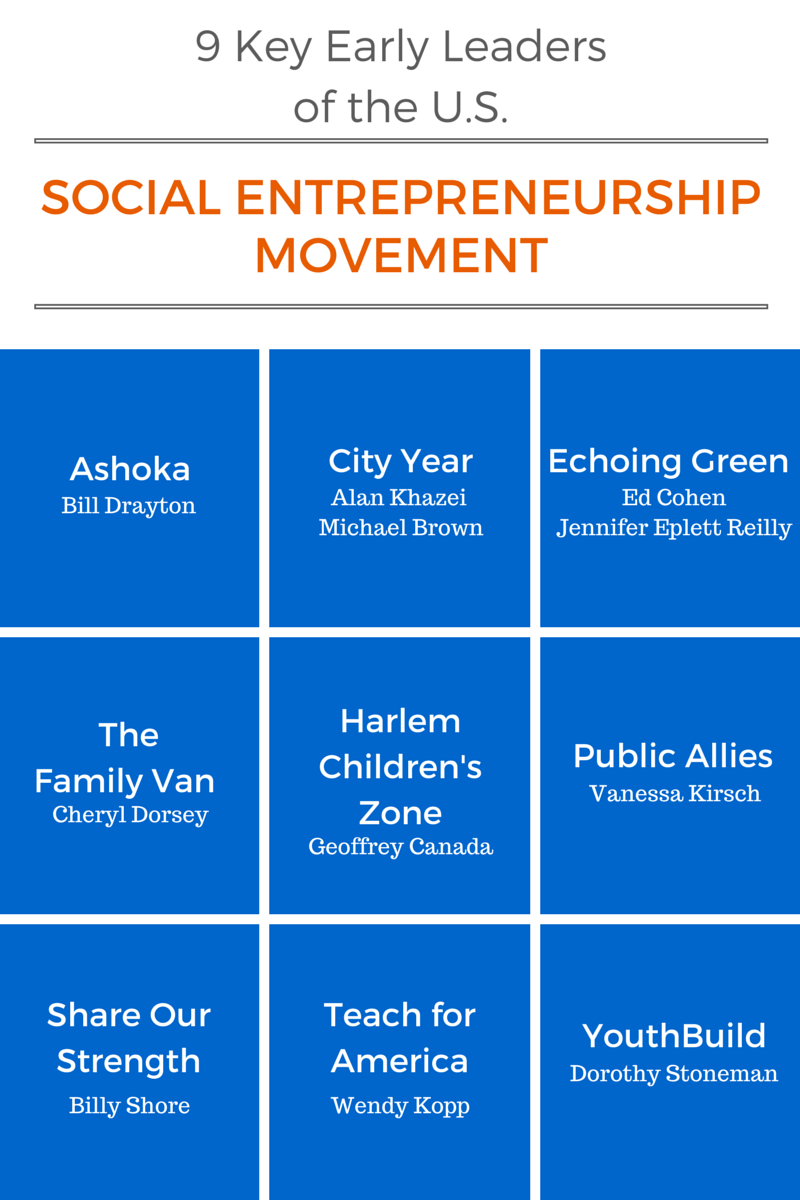
When I co-founded City Year with my college roommate Michael Brown in 1988, social entrepreneurship was emerging as a dynamic approach for social change. This movement, led worldwide by Bill Drayton of Ashoka, included organizations like YouthBuild, Teach for America, and Echoing Green (See image).
As new innovations emerged, the challenge then became scaling these innovative organizations and solutions.
Today with the help of public-private partnerships, Youthbuild USA now engages over 10,000 young adults in 260 programs in 46 states and 15 countries. Teach For America has over 10,000 corps members serving annually in over 46 regions across the country. Wendy Kopp’s latest international endeavor, Teach For All, is now operating in 34 countries. City Year is now in 27 cities in America with about 3,000 corps members serving annually, with additional programs in South Africa and the UK.
At the same time, the nonprofit sector has more than doubled in size growing from 700,000 registered organizations in 1988 to over 1.6 million today, employing 10 percent of the US workforce and accounting for 5 percent of US GDP making it the fastest growing sector in our society.
We’ve also realized that even with all this growth and success, no one organization, no matter how effective, innovative, or well-resourced, can single-handedly address complex challenges in education, health, the environment, fighting poverty and other issues.
Video: Watch a panel discussion on system leadership >
And as we did in developing City Year and many other successful social enterprises, we drew on the best lessons from other nonprofits, the private sector, and the government.
Increasingly, we recognize that a “collective impact” approach with a systems leadership strategy is needed to address these complex issues. Neither government nor the private sector alone can solve our problems. The nonprofit sector, while a great source for innovation does not have the resources alone to address these challenges. The best approach involves a combination of all three sectors. And importantly, we need the energy, commitment, and idealism of citizens who dedicate their time and energy in service and movements to help bring about this change.
If we can get organizations to work together with a commitment that “the whole really can be greater than the sum of its parts,” we can collectively work to address our biggest challenges in a systemic way.
We started Be The Change, Inc. with a notion that a new approach to systems change focused on collective action could lead to strong results. We’ve learned a few key lessons from our work with ServiceNation on national service, Opportunity Nation which promotes economic and social mobility, and Got Your 6 which works to empower veterans and close the civilian-military divide.
- New efforts need to be cross-sector and unite leaders and citizens from the private sector, non-profit sector, government, academic, entertainment, faith, military and philanthropic communities.
- Agendas should be drawn from both policy experts as well as on-the-ground practitioners who understand community impact.
- Coalition leaders need to practice effective “servant leadership” to create an environment where everyone’s voices are heard working toward common goals and agendas.
- Change strategies should incorporate policy change, cultural change, and programmatic efforts as models and laboratories.
- Traditional and social media play an important role in galvanizing awareness and change efforts.
All great change has come from citizen movements combined with enlightened political leadership. From the citizen soldiers of our revolution, to the suffragettes, the abolitionists, the trade unionists, the civil rights movement, environmental movement, anti-genocide movement, to the movement for LGBT rights and more, when we have chosen to “be the change” we seek in the world, great and transformative change comes about. If we are willing to embrace collective action efforts with a systems leadership approach, we will leverage all the tools to finally confront some of our most pressing challenges and continue on our path towards a more perfect union.
Alan Khazei is founder and CEO of Be The Change, Inc. and co-chair of the Franklin Project at the Aspen Institute. He is also co-founder and former CEO of City Year.
